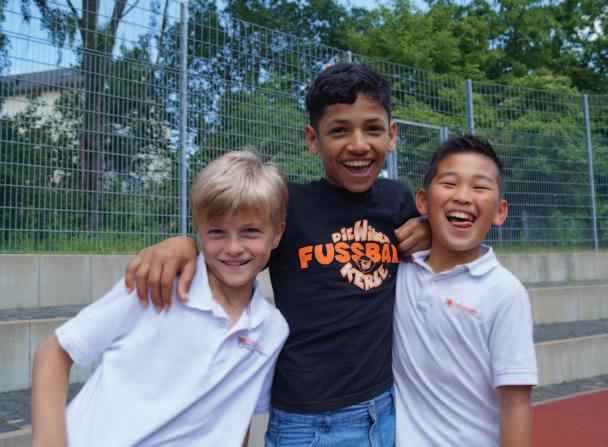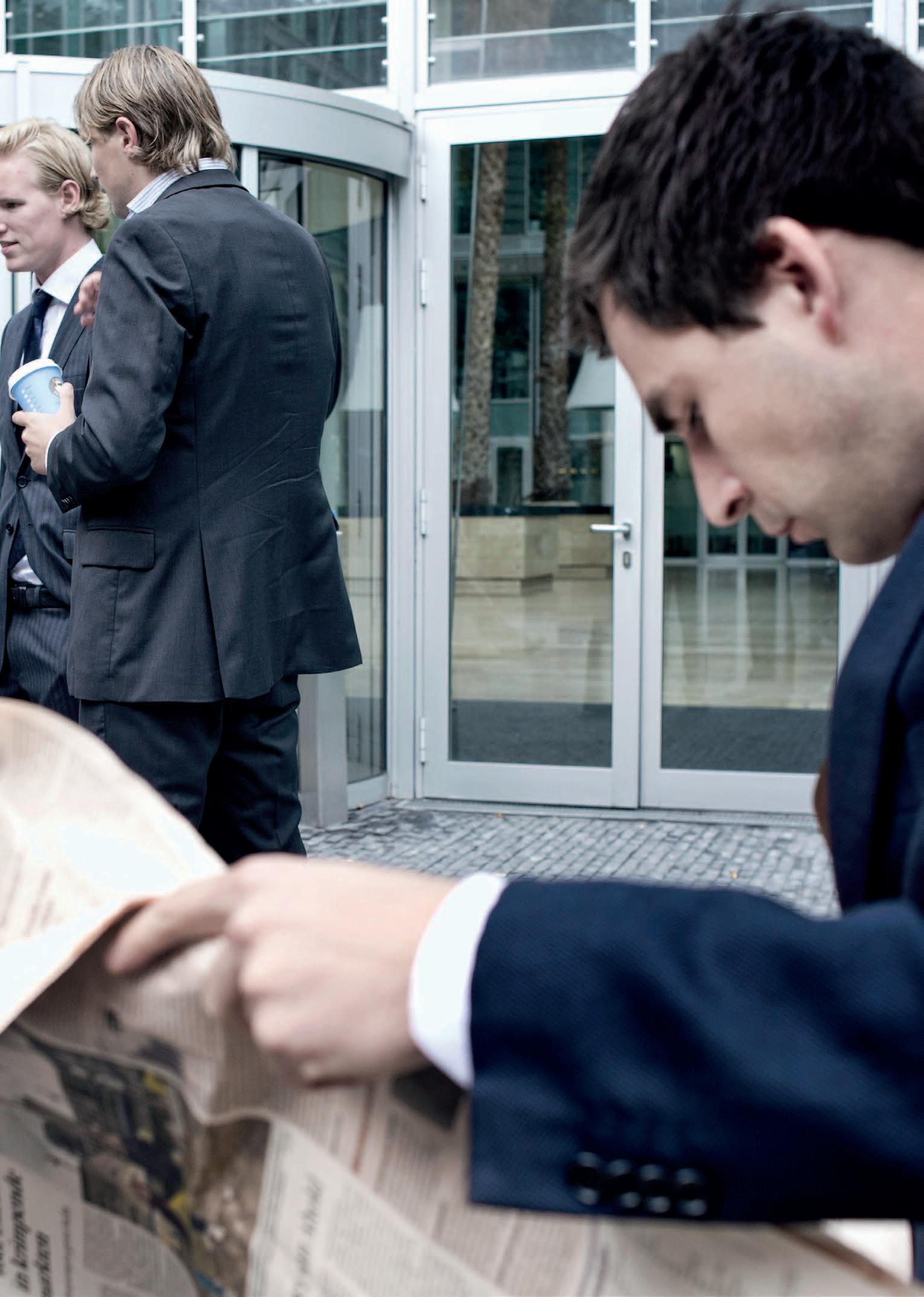
6 minute read
They’re not ‘refugees’, they’re people, Matthew Baganz
Strothoff International School is located in Dreieich, Germany, just 12 km from Frankfurt Airport. When families from Syria and Afghanistan began moving to Dreieich, and then into a temporary housing facility 200 metres from the school’s front doors, the call for support was clear. Although there was some concern about safety and health implications, the larger part of the Strothoff community agreed that this was both an opportunity and an obligation.
The natural place to start seemed to be monetary donations that could be used for whatever was needed. Parents contributed to bake sales and packed their children’s school bags with old books to be sold at book swaps. At Strothoff’s International Fair, community members sold regional German dishes and other international cuisine. After their unit of inquiry about businesses, International Baccalaureate (IB) Primary Years Programme (PYP) 4 and 5 students donated the profits from their Business Fair. As the specific needs became clearer to the school community, collections became more focused and meaningful, such Refugees being taught German by a volunteer at Strothoff
They’re not ‘refugees’, they’re people
Matthew Baganz reports on a school’s initiatives toward integration: a two-way street
International School as a winter clothing drive and a specific request for men’s professional attire.
A game-changing activity, however, was one that finally put a face to the fundraising. An initiative led by students as young as Pre-primary organised a toy drive. Through the local Integration Office teachers received the names and interests of a group of refugee children. Students then stocked care bags with toys, books, and treats, and painted rainbows and refugee children’s names – Yousef, Ali or Umar – on the sides.
Students were no longer blindly sending money to an imaginary person named ‘Refugee’; now Strothoff children were seeing and ‘meeting’ refugee children, if only through photographs at this point. The smiles reflected on either side of the action were one and the same.
Education and Raising Awareness
Along a path paved by Pre-primary children toward the development of new friendships, adults established educational initiatives with the goal of alleviating the hardship
The mayor of Dreieich visited the school to express his gratitude for the work undertaken with refugees of the integration transition. In collaboration with the Haus des Lebenslangen Lernens (House of Lifelong Learning), an educational campus that not only offers language courses to refugees but also provides temporary refugee housing, Strothoff teachers and parents began to volunteer to teach language courses in German and English.
Afternoon German classes continue to be offered after the school day, and refugee parents who attend these classes can leave their children at Strothoff International School to be cared for by a group of IB Middle Years Programme (MYP) students and an adult supervisor. An English class is also offered three times a week to a select group of unaccompanied refugee teenagers. In addition to the recognition that language alone can be a definitive barrier to successful integration (hence the language classes), other features of local culture naturally merged into the curriculum, including the presumptions of specific posture and eye contact tendencies, social conduct such as acceptable personal space, and national politics and histories.
Through these interactions the Strothoff community considerably deepened its own sense of international mindedness. Teachers and students explored the central ideas already prescribed in their units and linked them to the current events occurring outside the school’s windows. A PYP 1 unit exploring how children around the world play with toys inspired the care bags that brought the situation to a whole new level. A PYP 2 unit exploring children’s rights led to a primary-wide discussion with representatives of Kinderhilfe Afghanistan (German Aid for Afghan Children). A group of PYP 5 students elected to focus on the refugee crisis from a broad theme about societal decision-making, and a secondary teacher took MYP 5 students to a town hall meeting to witness the political discussion about how to handle the refugee crisis.
Trumping money – and even education, many might argue – is the notion of friendship and camaraderie. What connections might be made between international MYP students and refugee toddlers when they play with Lego while their parents are learning the local language? Inspired by the action a PYP 5 exhibition group took by visiting a local shelter for a playdate, several other students initiated a bi-weekly gathering where refugee children were invited to the school playground to escape, for four hours a week, the boring hallways of the shelter.
Are these collaborations the seeds of greater action, such

as inviting a refugee family into your home to live with you? When the Mayor of Dreieich commended the Director of Strothoff International School for doing just that, the Director replied that ‘It was self-understood. These are people. And they needed help. There should be no question’.
The Lasting Future
On the first day of the playground initiative, when Strothoff and Syrian children played side by side, one Strothoff student told a teacher with a camera ‘I want a picture with one!’ Four weeks later, that same student couldn’t find a particular Syrian child on the playground and asked ‘Why didn’t Rita come today?’ For that Strothoff student, ‘one’ (an objectified reference to a nameless body) progressed to ‘Rita’ (the name of a little girl with a personality) – a significant step from disassociation toward unification.
The more convenient methods of reaching out to those in need, such as collecting donations or sticking a ‘unity for all’ bumper sticker on the family car, are described by some as ‘slacktivism’ – acts ‘which do little more than simply announce one’s support for a particular … cause’ (Skoric 2012). And indeed for some it does stop there. But for others, spreading awareness of accurate information – be it through bake sales or Likes on Facebook, may very well be the spark to real change, to open and unprejudiced integration, and true friendship.
Strothoff teachers are exploring how to deepen their understanding and increase their assistance of the refugee crisis, perhaps by participating in an international school collaboration, coordinating new foreign exchange programmes, or learning Arabic or Persian. Regardless of location, size, or budget, all international schools have an opportunity (or is it obligation?) to be representatives among the wider community in the pursuit of global mindedness.
Reference
Skoric, M M (2012) What is Slack About Slacktivism? in Methodological and Conceptual Issues in Cyber Activism Research: Inter-Asia Roundtable, Asia Research Institute, National University of Singapore [pp 77-92]
Matthew Baganz is the PYP 5 teacher and PYP Maths Coordinator at Strothoff International School in Dreieich, Germany. Email: matthewbaganz@gmail.com

BACHELOR’S PROGRAMME PHILOSOPHY, POLITICS AND ECONOMICS (PPE) IN AMSTERDAM!


The Bachelor Philosophy, Politics and Economics (PPE) at Vrije Universiteit Amsterdam will prepare you for future leader ship positions in business, politics, academia, and beyond. The programme offers thorough knowledge of the three core disciplines, and teaches students to apply this in an integrated way by combining theory and practice in a unique way. If you are interested in the ethics of public policies, understanding the way that political decisions shape markets, or thinking about how scarce resources should be globally distributed, then PPE is for you. PPE is a highly selective bachelor’s programme at VU Amsterdam for excellent and motivated students.
THE DEADLINE • Non-EU students: April 1 st • EU students: May 1 st













